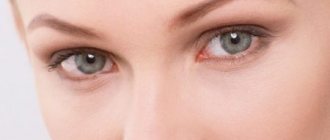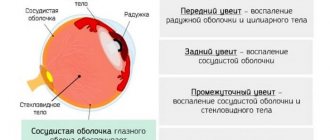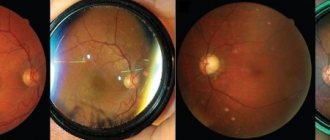Causes
If you start to feel pressure on your eyes, you need to pay attention to the regularity and circumstances of this phenomenon. A one-time incident, especially for people who spend a lot of time in front of the computer or work with papers for a very long time, does not require special attention. In this case, you should consult a doctor only if additional symptoms appear. If there is constant pressure on the eyes, this can be caused by the development of various diseases. Under such circumstances, the problem should be taken seriously.
There may be pressure on the eyes for the following reasons:
- Psycho-emotional stress. With any serious stress related to the psyche or emotions, the head begins to hurt, which manifests itself as pressure on the eyes. The temple may also become sore, and this may affect only one of them.
- Migraine. This type of headache is known to few people, but everyone who has experienced it would prefer to avoid repeated attacks. Often this phenomenon is accompanied by pressure on the organs of vision, nausea, dizziness, intolerance to sound and light. The pain itself can affect the left or right temple, and sometimes it radiates to the forehead, eyes or bridge of the nose.
- Cervical osteochondrosis. When the spine is curved in the cervical region, the head hurts and puts pressure on the eyes. Vessels may also pulsate.
- Eye diseases. Intraocular infections, inflammation, stye affecting the eyelid or eyelashes, as well as various injuries to the cornea - all of them contribute to the appearance of unpleasant sensations reminiscent of pressure from the inside. The eyes may also become red or watery, dizzy, the picture may become blurred, and in special cases, swelling of the upper or lower eyelids may appear.
- Sinusitis. The inflammatory process in the nasal sinuses causes pressing sensations, severe pain in the bridge of the nose or the entire head. Therefore, when your nose begins to get stuffy during a runny nose, you need to drip drops and blow out any accumulations of mucus.
- Hypertension, hypotension. Deviations related to pressure negatively affect the blood vessels of the brain. With high or low blood pressure, the back of the head begins to hurt, the head may feel dizzy, and the eyelids become heavy. Low levels can also cause severe weakness and pale skin.
- Poor blood circulation in the brain. With mild disorders, pain appears throughout the head, which puts pressure on the organs of vision. If a stroke occurs, the symptoms will be very severe and the victim will require immediate hospitalization. If a person complains of pain, and then suddenly falls, has trouble breathing, or experiences uncontrollable muscle contractions (convulsions), then an ambulance should be urgently called.
- Tumor. With any neoplasms, the eyes hurt, as if there is pressure on them. Even simple tumors such as a cyst, which are normal in some cases, can cause discomfort.
- Traumatic brain injuries. Getting injured is always accompanied by a concussion, which causes pressing sensations. There may be no other symptoms at all, but sometimes there is a feeling of nausea, double vision, and weakness.
- Infections. In infectious diseases, the forehead can also burst from the inside, affecting the eyes. Newborns who become infected during childbirth are especially susceptible to this.
- Hormonal changes. Unpleasant feelings regarding the eyes can occur in women due to hormonal changes. Women are most susceptible to this phenomenon during pregnancy, causing nausea, weakness and other symptoms.
- Colds (ARVI, acute respiratory infections, flu). The person experiences all the classic symptoms of the disease, as well as a pressing sensation in the eyes.
This concludes the main causes of pressure that affects the eyes. However, it can also occur with other health problems. Among them:
- Temporomandibular joint dysfunction;
- Vascular aneurysm;
- Diabetes;
- Diseases of the endocrine system;
- Decreased immunity;
- Negative effects of bad habits;
- Dental diseases;
- VSD (vegetative-vascular dystonia);
- Allergic reactions;
- Poisoning of the body.
Even incorrectly chosen glasses contribute to the appearance of pressing pain, which can also cause the eyeballs to turn red and tear production to increase. Children who have only recently bought glasses face this very often. The child may not tell adults about his feelings, which is why special attention should be paid to him.
Many diseases require medical intervention, and if prolonged, serious complications can occur. Therefore, after the periodic appearance of unpleasant sensations, you should immediately make an appointment with a doctor.
Pain caused by tension
One of the reasons why pain in the eye area and in the head in general may occur is simple fatigue.
Fatigue and excessive eye strain due to working at the computer or with documents can cause headaches in a person. In particularly advanced cases, general weakness, dizziness, and nausea occur. At the same time, the eyes become red, because when working at a computer a person blinks less often, which affects the condition of the mucous membrane.
To avoid such problems, it is necessary to perform so-called “office” gymnastics for the eyes, regularly arrange days without a computer, observe a work-rest schedule, and use artificial tears.
Incorrectly chosen glasses can also cause headaches. If a person needs to wear glasses, but he does not, or the glasses do not fit him, the optic nerve is constantly very tense, which affects the occurrence of pain.
Sometimes, if there is a strong discrepancy between the vision and the glasses chosen, a person becomes dizzy, feels nauseous, and his eyes become red and watery. The only solution is to visit an ophthalmologist who will help you choose the right glasses.
Diagnostics
To find out why there is pressure on your eyes, you should definitely visit an ophthalmologist. First, the doctor will measure your intraocular pressure. Normal values are 9-22 mm Hg. Art. If there are deviations, the ophthalmologist will prescribe an additional examination of the optic nerve. For a more accurate diagnosis, he will send the patient for examinations such as:
- MRI, CT. With their help, you can find out if there are tumors, inflammations and other similar diseases in your head.
- Vascular ultrasound. This diagnostic method will show the presence of vascular damage, the formation of blood clots, as well as the speed of blood circulation.
After a complete examination, the ophthalmologist will prescribe treatment or give a referral to another specialist if the root causes of pressure are not related to the organs of vision.
Drug treatment
Medicines can only be prescribed by the attending physician. You cannot choose medications yourself, because... This can cause serious harm to your health. Immediately after making a final diagnosis, the doctor will prescribe medications against the underlying cause. But they can also prescribe pills:
- Painkillers (Analgin, Pentalgin).
- Anti-inflammatory (Nurofen, Ibuprofen).
- Antibiotics (Amoxicillin, Cephalexin).
- Diuretics (Diacarb, Furosemide).
- Tranquilizers (Phenazepam, Chlordiazepoxide).
Additionally, eye drops may be prescribed. They will be used to:
- Relieve inflammation (Diclofenac).
- Constrict the pupil (Pilocarpine).
- Increase fluid outflow (Xalatan).
- Reduce fluid production (Bitoptik).
Also, to increase the effectiveness of treatment, the doctor may send the patient for therapeutic massage or special physical therapy. In special cases, when the disease is extremely dangerous, surgery may be required.
You can effectively get rid of pressure on your eyes only with an integrated approach to solving the problem.
Folk remedies
Time-tested traditional methods allow you to quickly feel relief from even severe symptoms. However, they are not able to cure serious diseases, which is why they can only be used for minor problems.
The most effective methods:
- Eye wash. You will need to use a decoction of chamomile or aloe. You need to moisten a cotton pad in it, and then wipe your eye with it from the edge of your head to your nose so that the liquid is slightly squeezed onto the mucous membrane.
- Taking decoctions. It is enough to make a decoction of mint or lemon balm and drink it to reduce the pressure inside the eyes, getting rid of unpleasant sensations.
- Eye lotions. You need to moisten the bandage in nettle or chamomile infusion and apply it to your eyes for 10 minutes.
If after such procedures there is no improvement, you must consult a doctor.
When do you need to see a doctor urgently?
Although eye pain may seem easy to treat at home, sometimes situations arise that require urgent medical attention. Do not delay visiting your doctor if:
- The pain does not go away after undergoing relieving procedures and taking painkillers.
- Unpleasant sensations in the eyes appear regularly, no matter how long the patient undergoes treatment.
- Pressure in the eyes is accompanied by acute intense “aching” pain in the eyes.
- Painful sensations are accompanied by a rise in temperature.
If a person has sore eyes and nausea, the discomfort is accompanied by a severe headache in any part of the head, this may indicate the development of serious diseases: stroke, cancer, meningitis. These pathologies require urgent treatment in a hospital setting.
Special exercises
If the pain is caused by overexertion or fatigue, then you can get rid of it with simple exercises. They can be used by both adults and children. What to do if there is pressure on your eyes:
- Look up and down, left and right.
- Draw a circle with your eyes clockwise, then repeat in the opposite direction.
- Draw a square first clockwise and then vice versa.
- Draw several figure eights horizontally and vertically with your eyes.
You can perform the exercises many times (up to 10 times), following the specified order. It is recommended to additionally repeat them with your eyes closed.
If pressing pain is caused by serious diseases of the organs of vision or brain, it is strictly forbidden to perform these exercises, press on the eyeballs for massage, bend over and perform strenuous physical activities.
Prevention
You can avoid unpleasant sensations associated with the organs of vision with the help of prevention. It involves changing your lifestyle and maintaining your health at a high level. What you will need:
- Give up bad habits (do not drink or smoke);
- Ensure that your home environment is as healthy as possible;
- Monitor your weight;
- Get enough sleep;
- Visit your doctor regularly if you have chronic illnesses.
Following these simple rules will reduce the risk of headaches that put pressure on the eyes to a minimum.
Migraine and cluster pain
Another reason for severe headaches may be migraine. The sensations that arise during a migraine are often described as unbearable, and the pain in this case is special: localized on one side, radiating to the temples, eye area or back of the head. As for the eyes, the right or left eye may hurt separately, visual disturbances, distortions, etc. appear. There is excessive sensitivity to bright light, noise, strong odors, dizziness, nausea, and vomiting.
This condition can last up to 72 hours, then goes away on its own.
Scientists have still not precisely established the causes of migraine, and treatment boils down to identifying and eliminating provoking factors, as well as taking potent medications.
Cluster pain is sometimes confused with migraine, but these conditions are still different. With cluster pain, the sensations are localized in the forehead and eyes, but their exact cause has also not been identified.
Painful sensations may vary in duration, frequency, intensity and severity. Other signs appear: watery eyes, red eyes. Unfortunately, painkillers often fail to eliminate symptoms.










